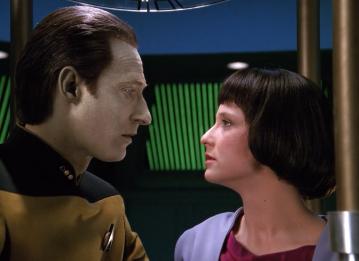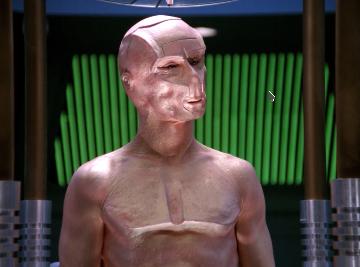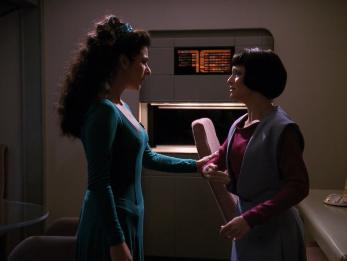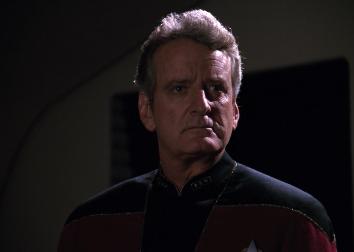The Offspring, Star Trek TNG
Mar 22, 22The Offspring (Star Trek, The Next Generation, Season 3)

Star Trek, The Next Generation episode "The Offspring", directed by Jonathan Frakes for the show's third season, is about as powerful an episode of science fiction as is probably possible. I have here and there over the years screened this episode to my composition students as part of a larger discussion about dramatic works, and it will jerk a tear or two out of a significant percentage of those students, especially if they happen to be parents.
The show begins with the android Lt. Commander Data revealing his newest project to a hand-picked selection of the crew, namely Troi, Wesley Crusher, and chief engineer Geordi La Forge. They are astouded to find that Data has successfully created another android like himself, something that heretofore no one had been able to accomplish, and that android, or offspring, which Data names Lal (which later is revealed to mean "beloved" in Hindi) shocks them when it refers to Data as "father".

Right away Captain Picard balks at the notion that the new android should be considered a child and Data its father. Picard sees these roles as exclusive to human relationships, not machines, but Troi insists that the description is accurate, that Data has procreated in the only way he could, and that this new family ought to get all the respect that would be afforded to any other.
The episode quickly establishes two story-lines centered on Lal. The first is her awkward growing pains as she learns to navigate the complexities of human social life, and the other is how an admiral from Star Fleet, who sees her as a priceless piece of technology, wants to separate Lal from her father Data so as to protect, study, and probably eventually replicate her.
Early on in this episode a meta-theme is established about how the episode itself will be seen differently by those who are parents and by those who are not. It explicitly calls our attention to that meta-theme when Troi quips to Picard, who initially resists calling Lal a child, "You've never been a parent." And then later, after Picard has changed his mind and becomes an iron advocate for Lal and Data's family in the face of an Admiral who wants to split them up, the Admiral, in a devilishly-superb piece of writing, flips this idea and makes the same argument to Picard, "You're not a parent, Captain. I am. I have learned, with difficulty, that there comes a time when all parents must give up their children for their own good." Few episodes of televison are ever able to do anything remotely like this, to call our attention to how parenthood changes us while simultaneously giving us a new set a blind spots, and it is handled deftly without ever being ham-fisted or with even a tinge of sentimentality.

Hallie Todd plays Lal, and her performance is perfect. I mean that. It is perfect, to the point that I can't even wrap my mind around how she pulled it off, how she was able to play an emotionless android with the mentality of a child, yet a child with a highly developed artificial brain that has all of the information and data of Star Fleet right at its fingertips, but who doesn't have the context to understand that information, and Todd conveys all of it. We can see her being overwhelmed by all of that information and struggling to make sense of it. Furthermore, as Lal goes from an emotionless clone of Data who cannot feel human emotion, to, through a mysterious quantum-level glitch, experiencing a flood of emotion in the form of fear when the admiral wants to take her away from her father, to, at the end of her brief life when she experiences love for her father, Todd, impossibly, conveys all of it and she hits me in the center of my heart every single time I watch this episode. Todd's performance is among the best I have ever seen.

This episode is the best of Star Trek, a true zenith in the Star Trek canon that shows what this show is capable of doing at its very best. I can't think of any other television episode that does what this episode does, touches on and comments about all of these complex themes of love, parenting, courage, life and death, all in a way that could never be discussed in this particular way without the Star Trek frame. Watching this, it is hard not to also be made aware, in a sick-in-the-pit-of-my-stomach kind of way, how truly awful are the current iterations of Star Trek (Picard, Discovery), which have completely broken faith with the spirit of the franchise that makes it so compelling in the first place. Once you understand the highs to which Star Trek can soar, the gutter-dwelling and dumbed-down new series become all the more disgusting and insulting, that these abominations are what the younger generation are sold as Star Trek. They are just a complete and total breach of faith.
For me, there are three moments in this episode in which I have to fight back tears, when Lal first comes home and Data tells her he has many experiences he wants to share with her, when Lal and Data hold hands, and of course at the end when Lal dies. It jerks these tears without a trace of sentimentality, no small feat, due to its science fiction frame that calls on us to look at parenthood from an angle that would never be possible without the science fiction frame, which is a point I make when I teach this film, that the best science fiction takes full advantage of its frame to tell stories that wouldn't be possible without it.